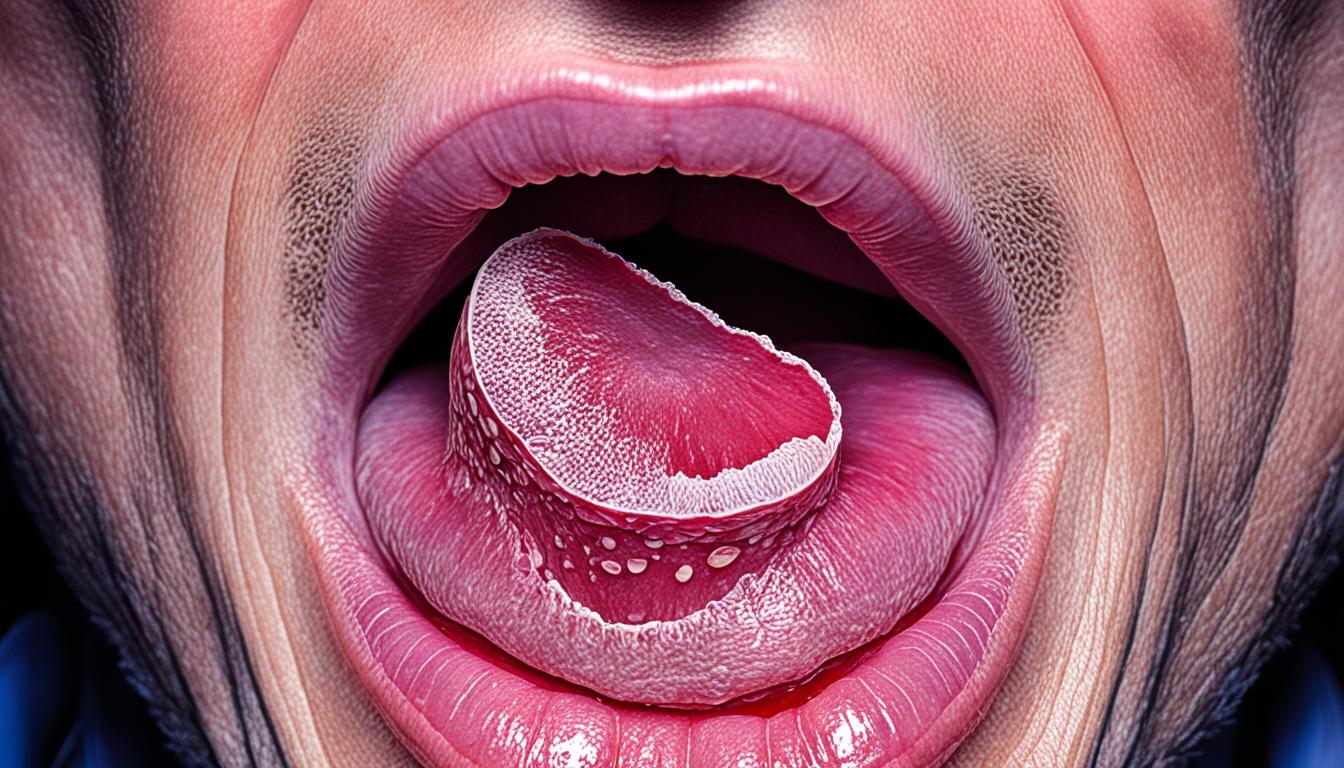Tongue cancer, referred to as oral or mouth cancer, begins in the tongue’s cells. It’s a severe illness needing quick diagnosis and right treatment for good results. Knowing its symptoms, causes, and treatment choices is key for patients and doctors.
Using tobacco, drinking alcohol, getting HPV, and having stem cell therapy are main risks for tongue cancer. They can up the cancer risk. It’s important to know these risks for early detection and stopping the disease.
Spotting tongue cancer symptoms early is crucial. Signs like odd patches or lumps on the tongue, non-healing mouth sores, and tongue movement issues should worry you. So is pain when eating or talking and swollen neck lymph nodes. If you notice these, see a doctor without delay.
Diagnosing tongue cancer needs a deep look from a health expert. This may involve checking your medical history, looking at your mouth and throat closely, and using tests like biopsy and imaging. These steps show the cancer’s stage and size, guiding your treatment.
For treating tongue cancer, doctors look at the cancer’s stage, its place, and your health. Surgery to cut out the cancer is common. So is using radiation and chemo to kill any leftover cancer cells. Sometimes, stem cell therapy is also offered to help the tongue grow back healthy cells.
Getting diagnosed early and treated on time greatly impact your chances against tongue cancer. After treatment, keeping in touch with your healthcare team ensures any new cancer signs are quickly noticed. This active watch helps in managing the disease and living better.
Key Takeaways:
- Tongue cancer starts in the tongue’s cells and has risks from tobacco, alcohol, HPV, and stem cell therapy.
- Signs include odd tongue patches, non-healing sores, trouble moving the tongue, and neck node swelling.
- Doctors diagnose it through exams, medical history reviews, and special tests.
- Its treatment includes surgery, radiation, chemo, and sometimes stem cell therapy, picked based on cancer details.
- Getting diagnosed and treated early is vital for a good outcome.
Causes and Diagnosis of Tongue Cancer
Tongue cancer can be caused by several things. These include:
- Tobacco Use: Smoking or using smokeless tobacco can lead to tongue cancer. This is because tobacco has harmful chemicals.
- Alcohol Consumption: Too much alcohol over a long time can also raise the risk. It does this by making the mouth more likely to take in cancer-causing agents.
- HPV Infection: Some types of the human papillomavirus (HPV) might cause the disease. HPV 16 and 18 are the main ones responsible.
- Stem Cell Transplants: After a stem cell transplant, the risk might go up. This is because of the drugs that lower the immune system after the procedure.
- Genetic Factors: Genetics also play a role in some cases. If your family has a history of mouth cancers, you might be at a higher risk.
To find out if someone has tongue cancer, doctors use a number of steps. This includes:
- Looking at the person’s medical history is the first step. Doctors ask about symptoms, risks, and past health issues.
- They then check for common symptoms, like sores or lumps on the tongue. They’ll also look for problems using the tongue or mouth pain.
- Next, a physical exam of the mouth and neck might be done. This helps spot any visible signs of cancer.
- Doctors might also do an exfoliative cytology. This means checking cells from the tongue under a microscope for signs of cancer.
- Then comes the biopsy. This is when a small piece of tongue tissue is taken and looked at in a lab to see if there are cancer cells.
- Endoscopy is another method. A thin tube with a camera is used to look at the back of the throat and esophagus.
- Various imaging tests help see the cancer better. These include CT scans, MRIs, and more.
By knowing what causes tongue cancer and using the right tools to diagnose it, doctors can find it early. This leads to better chances of success with treatment.
Treatment and Outlook for Tongue Cancer
The main way to treat tongue cancer is through surgery to take out the cancer. Additional treatments like radiation and chemo might be used too. This depends on the size and where the cancer is. The patient’s health plays a big part in choosing the right treatment.
Several things determine how well someone might do after tongue cancer treatment. Things like the cancer’s stage at diagnosis and if it has spread, plus how quickly treatment begins. Survival chances for tongue cancer differ depending on the cancer’s location and stage.
According to the National Cancer Institute, the 5-year survival rates for tongue cancer are 86.6% for localized, 69.1% for regional, and 39.3% for distant cancers[^1^]. Yet, remember, these numbers are just an average. Each case is unique. Regular check-ups are vital to catch any cancer return early.
Getting diagnosed early and treated right makes a big difference for tongue cancer outcome. Early recognition and swift action can lead to successful treatment. This means a better chance at life quality for patients.
[^1^]: National Cancer Institute. Survival Rates for Oral Cavity and Oropharyngeal Cancer. Retrieved from [https://www.cancer.gov/types/head-and-neck/patient/oral-survival](https://www.cancer.gov/types/head-and-neck/patient/oral-survival)

